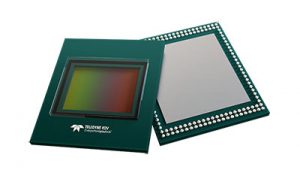5 Mpixel CMOS image sensor ideal for high-speed scanning and embedded vision solutions
Teledyne e2v, a Teledyne Technologies company and global innovator of imaging solutions, announces the expansion of its Snappy family of image sensors with a new 5 Megapixel device. The SnappyTM 5M is designed for barcode reading, 2D scanning and other demanding applications. Available in both monochrome and color, the Snappy 5M has a small 1/1.8 inch optical format, containing a 2.8 μm, low-noise, global shutter pixel, and arranged in a 2,560 x 1,936 array.
The device can stream video at ~50 fps at 10 bits over a 4 wire, MIPI CSI-2 interface, and is housed in a small compact fan-out organic package.
Snappy 5M is designed to enable fast, extended range scanning and includes powerful unique patented features and region of interest modes:
• A Fast Self Exposure (FSE) mode automatically calculates the optimum integration time that is applied to the first image from the device. The mode is user programmable and provides continuous fast decoding, tolerating any kind of lighting or dynamic lighting environment. This is advantageous compared with conventional auto exposure methods, improving convergence speed and robustness.
• A Smart ROI feature searches for barcodes in the image frame, and reports their locations as metadata in the image footer. The regions of the image containing barcodes are discerned from the background image to considerably reduce downstream image processing (FPGA/CPU/DSP) power, time and cost. Up to 16 different regions can be detected simultaneously. Other forms of repetitive signatures such as printed character strings can also be detected for document scanning and OCR applications.
The Snappy family of sensors enable a number of applications including embedded industrial imaging systems, drones/UAVs, IoT edge devices, intelligent surveillance cameras and augmented reality/virtual reality.
This latest 5 Megapixel device is a member of the expanding Snappy family of sensors. The sensors have identical software and hardware requirements, which bring further cost savings by enabling a complete range of scanners/cameras at different resolutions from a single system design effort.



